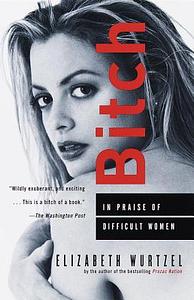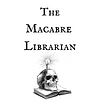Take a photo of a barcode or cover
This was a very interesting book. There were certainly things that Wurtzel had to say that I don't agree with or at least don't feel as strongly about, but even in those instances, she makes a very good case that is difficult to argue with. Overall, I found it to be a very well-written book, and I feel at least a bit more knowledgeable about many issues now than I was before I read it.
I read this book in college, and while it was indeed rambling and sometimes incoherent, I found that I enjoyed the topic. In general I am not a fan of Wurtzel's work, I couldn't finish Prozac Nation, but the premise of this book and the choice of women kept me with this one until the end. This probably could have been handled better by another author, but it worked well as an introduction to the idea that "difficult" women as being worthy of more than being written off.
I was disappointed. So many of my friends love this book, but I thought large sections of it did not age well. It was especially hard to read Wurtzel's assertion that for some women, domestic violence is the price of admission into some relationships. In this cultural moment, that doesn't really work anymore.
I'm definitely not going to attack Elizabeth Wurtzel for writing this book, because it makes some really good points and it was quite interesting. But I had to stop reading it.
I first thought about discontinuing it because I read a review that said she maintained that Mary Queen of Scots didn't get beheaded. She totally did. Whether or not you're making good points, you have to get your facts correct. What finally did it was her conclusion about Mary Jo Buttafuoco, that she was just a weak person who wanted to stick her head in the sand and pretend her husband wasn't a monster, and that she'd rather be Amy Fisher dead than Mary Jo alive, or something to that effect. I actually looked up an old The View interview with Mary Jo, and she did leave Joey seven years after she was shot. She then wrote a book about what a sociopath he was and how people like that will manipulate you into staying in the relationship. So what I'm saying is, this book is way outdated in some cases and as far as I'm concerned, I can't really trust her historical accuracy. Furthermore, ripping Mary Jo apart and nearly making Amy Fisher a heroine isn't cool. Elizabeth Wurtzel's had her fair share of mental problems, so she should have understood the kind of life that Mary Jo was living.
And yes. The book rambles. It's quite frustrating at first, but you get used to it. In my opinion, though, it's not worth the time.
I first thought about discontinuing it because I read a review that said she maintained that Mary Queen of Scots didn't get beheaded. She totally did. Whether or not you're making good points, you have to get your facts correct. What finally did it was her conclusion about Mary Jo Buttafuoco, that she was just a weak person who wanted to stick her head in the sand and pretend her husband wasn't a monster, and that she'd rather be Amy Fisher dead than Mary Jo alive, or something to that effect. I actually looked up an old The View interview with Mary Jo, and she did leave Joey seven years after she was shot. She then wrote a book about what a sociopath he was and how people like that will manipulate you into staying in the relationship. So what I'm saying is, this book is way outdated in some cases and as far as I'm concerned, I can't really trust her historical accuracy. Furthermore, ripping Mary Jo apart and nearly making Amy Fisher a heroine isn't cool. Elizabeth Wurtzel's had her fair share of mental problems, so she should have understood the kind of life that Mary Jo was living.
And yes. The book rambles. It's quite frustrating at first, but you get used to it. In my opinion, though, it's not worth the time.
I actually only read half of this and just couldn't get into it. I knew when I picked it up that it would be radically different than Prozac Nation and wasn't expecting the same writing style but it didn't keep my interest. I keep saying I'll pick it up again but I haven't lately. I love the way Elizabeth Wurtzel thinks and I'm sure there is a lot of value in this book but I haven't found it yet.
This book is a lot of in your face things, but it is not about praising difficult women, or any women for that matter. Unless by 'praise' she means put all the women who she deems as strong feminists on the broken shoulders of the women she judges to be weak, asking for it types. This angry brand of pretend feminism, tearing weak women down to give the illusion of putting others up, is immature and uncreative. This book may have been relevant when the song of the same title was topping the charts but it has no relevance now outside of a sociological examination of the time frame in which it is set. The tirades and tantrums are endlessly angry, judgmental, and unforgiving. In each section she says the same damn thing fifty different ways so that by the end of the fifteenth overly detailed paragraph you have lost whatever point she was trying to make, numbly shaking your head, inadvertently thinking 'well, someone didn't get hugged enough as a child.' Hating on other women who you judge to be weak in order to 'tough love' them into your definition of strength does not make you a feminist, it makes you Regina George. This book is not about praise; it is about anger and damnation, sprinkled here and there with some spite and malice.
I think I only continued to read this cause 1) I appreciated the pop-culture references and 2) I can appreciate a good rant. However that being said I don't think the author understands feminism as well as she thinks she does - she also made contradictory statements about it specifically I can recall her saying in one chapter that Betty Friedan in co. in the 50s represented the beginning of the movement and then later on she mentions how it was Mary Wollstonecraft... which just seems sloppy and annoys me to no end.
I also really don't understand the focus paid to Nicole Brown Simpson in the last chapter as she is never portrayed by the author as being a difficult women and the author expressed some pretty ignorant opinions on battered women - basically blaming them for staying and their abuse and all but saying that they merit to die at the hands of their abusers if they stay.
There was an epilogue - which you know what I didn't deign to read because I was just so frustrated at that point - the bibliography is probably the best part of this.
I also really don't understand the focus paid to Nicole Brown Simpson in the last chapter as she is never portrayed by the author as being a difficult women and the author expressed some pretty ignorant opinions on battered women - basically blaming them for staying and their abuse and all but saying that they merit to die at the hands of their abusers if they stay.
There was an epilogue - which you know what I didn't deign to read because I was just so frustrated at that point - the bibliography is probably the best part of this.
challenging
dark
emotional
hopeful
informative
inspiring
reflective
slow-paced





